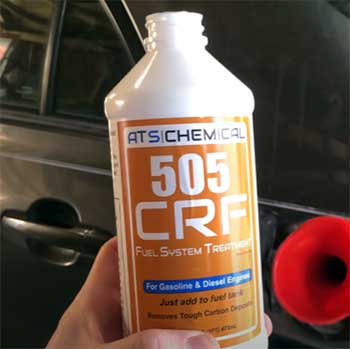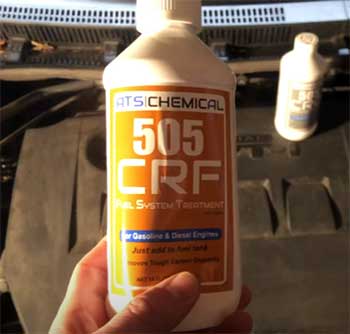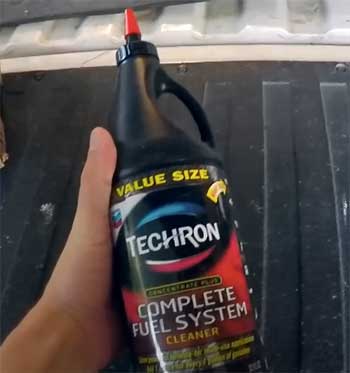If you’re like me, always on the lookout for ways to keep your car running smoothly and efficiently, you might have come across a myriad of fuel treatments claiming to work miracles. One product that stands out in this crowded market is the ATS 505 CRF Fuel System Treatment.
Whether you’re dealing with a sluggish engine or just looking to boost your car’s performance, this might be the solution you’ve been seeking. Let’s explore why the ATS 505 CRF is worth considering and how it compares to other brands out there.
My Experience With 505 CRF Fuel Treatment
When I first came across the ATS 505 CRF Fuel System Treatment, I was cautiously optimistic.
My 2014 Hyundai Elantra had been feeling a bit sluggish, especially when accelerating.
Despite my reservations, I decided to give it a go based on the glowing recommendations from mechanics I trust, particularly Scotty Kilmer.
His endorsement was enough to convince me that this product might just be different from the countless others I had tried in the past.
The process was straightforward. I waited until my gas tank was almost empty, then added the ATS 505 CRF before filling up with premium gasoline. The instructions were clear—pour the entire contents into the fuel tank, no mixing with other chemicals.
I appreciated the simplicity since I’m not a fan of overly complicated procedures when it comes to car maintenance.
As I started driving, I didn’t notice any immediate changes. However, after about 10 miles, things began to shift. The first thing I observed was a reduction in engine noise; it was running more quietly than before. By the time I had driven about 30 miles, the performance improvements were unmistakable.
The car felt more responsive, particularly during acceleration. It wasn’t a dramatic change but a noticeable one—enough to make the driving experience more enjoyable.

Over the next few days, the improvements continued.
The engine ran smoother, and I experienced fewer hiccups during gear changes.
This was particularly evident when driving at highway speeds.
I’ve always been diligent about car maintenance, but this was the first time I felt a fuel treatment made such a tangible difference.
The ATS 505 CRF had managed to clean out the carbon deposits that were causing my engine to underperform.
What struck me the most was the consistency of the results. Often, treatments provide a short-term boost, but the ATS 505 CRF seemed to offer sustained improvement.
Even weeks after the initial application, my Elantra continued to run smoothly. I also noticed a slight improvement in fuel efficiency, though the primary benefit was the enhanced performance and smoother operation.
Pros And Cons of 505 CRF Fuel Treatment
Pros
- Effective Cleaning
One of the standout features of the ATS 505 CRF Fuel System Treatment is its ability to effectively remove carbon deposits from critical engine components. This isn’t just marketing fluff—the difference in engine performance post-treatment was clear.
My car’s responsiveness improved, and it felt like it had regained some of its lost vigor. The engine ran more efficiently, which in turn, slightly boosted fuel economy.
- Ease of Use
Another significant advantage is how easy it is to use. Unlike some treatments that require complex mixing or application processes, the ATS 505 CRF is straightforward. Just pour it into your fuel tank, and you’re good to go.
This simplicity is a huge plus, especially for those who aren’t particularly car-savvy. You don’t need any special tools or skills to use this product effectively.
- Versatile
The ATS 505 CRF is versatile, working with both gasoline and diesel engines. This broad compatibility makes it a great option for families with multiple vehicles or for those who switch between different types of vehicles.
Whether you’re driving a compact car, an SUV, or a truck, this treatment can help keep your engine in top shape.
- Trusted Endorsements

Having endorsements from trusted mechanics like Scotty Kilmer adds a layer of credibility.
It’s one thing for a product to claim it works, but having it recommended by a professional who has built a reputation on providing honest, reliable advice is a game-changer.
This endorsement was a significant factor in my decision to try the product, and it didn’t disappoint.
- Noticeable Performance Boost
From my own experience, the most compelling pro is the noticeable boost in performance. The engine ran smoother, acceleration was more responsive, and there was a tangible reduction in engine noise.
These improvements weren’t just temporary; they lasted for weeks, which speaks to the product’s effectiveness.
Cons
- Cost: It’s more expensive than some other options on the market.
- Frequency of Use: Needs to be used regularly (with every other oil change) to maintain optimal performance.
- Availability: Might not be available at all local auto shops, requiring online purchase.
Tips For 505 CRF Fuel Treatment
To get the best results from the ATS 505 CRF Fuel System Treatment, here are some maintenance tips:
- Follow Instructions: Always adhere to the recommended usage instructions. Using more than the specified amount won’t yield better results and can potentially harm your engine.
- Regular Use: For consistent performance, use the treatment with every other oil change.
- Combine Treatments: For optimal results, consider using the ATS CRO Oil System Treatment in conjunction with the fuel treatment.
- Monitor Performance: Keep an eye on your vehicle’s performance and fuel efficiency. If you notice any issues, address them promptly.
Comparison With Other Brands
When choosing a fuel system treatment, it’s essential to compare different options to see which one best suits your needs. Here’s a brief comparison of ATS 505 CRF with some well-known brands like Seafoam, Chevron Techron, and Lucas Fuel Treatment.
ATS 505 CRF
Pros:
- Highly effective in removing carbon deposits.
- Improves engine performance and fuel economy.
- Easy to use—just pour into the fuel tank.
- Works with both gasoline and diesel engines.
- Endorsed by trusted mechanics like Scotty Kilmer.
Cons:
- More expensive compared to some other brands.
- Needs regular use for optimal performance.
- Availability might be limited to online purchases.
Seafoam
Pros:
- Versatile—can be used in fuel, oil, and intake systems.
- Effective in cleaning and lubricating engine parts.
- Available at a lower price point.
- Easy to use and widely available.
Cons:
- May require multiple treatments for best results.
- Some users report less dramatic improvements in performance compared to ATS 505 CRF.
- Less specialized for fuel system cleaning alone.
Chevron Techron
Pros:

- Highly effective in cleaning fuel injectors and combustion chambers.
- Improves drivability and fuel efficiency.
- Available in convenient single-use bottles.
- Widely recommended by mechanics.
Cons:
- Similar in price to ATS 505 CRF, making it a premium option.
- Primarily focused on gasoline engines, less versatile for diesel.
- Some users report needing multiple treatments for sustained results.
Lucas Fuel Treatment
Pros:
- Affordable and widely available.
- Suitable for both gasoline and diesel engines.
- Cleans and lubricates the fuel system.
- Can treat a larger amount of fuel per bottle.
Cons:
- Results can be less noticeable compared to more specialized treatments.
- Some users report needing to use it more frequently.
- Less effective in removing heavy carbon deposits compared to ATS 505 CRF.
Summary
Each of these fuel treatments has its strengths and weaknesses. Here’s a quick summary to help you decide:
- ATS 505 CRF: Best for those looking for a highly effective and endorsed solution, especially if you’re willing to invest a bit more for superior results.
- Seafoam: A versatile and cost-effective option that’s great for overall engine maintenance but might require multiple applications.
- Chevron Techron: Ideal for those focused on fuel injector cleaning and willing to pay for a premium product with strong recommendations.
- Lucas Fuel Treatment: A budget-friendly choice that treats a large volume of fuel but may not deliver the same level of performance enhancement as the more specialized options.
Frequently Asked Questions (FAQ)
The best fuel injector cleaner often depends on your specific needs and vehicle. However, the ATS 505 CRF Fuel System Treatment stands out due to its proven effectiveness in removing carbon deposits and improving engine performance. Its endorsement by trusted mechanics like Scotty Kilmer adds to its credibility.
Scotty Kilmer, a well-known mechanic and YouTuber, has recommended the ATS 505 CRF Fuel System Treatment. He praises its effectiveness in cleaning fuel injectors and improving engine performance.
While fuel injector cleaners are generally safe when used as directed, overuse or incorrect application can potentially cause problems. It’s essential to follow the manufacturer’s instructions and not exceed the recommended dosage. Mixing different chemicals can also lead to adverse effects.
Yes, fuel system cleaners do work. They help remove carbon deposits from engine components, leading to improved fuel efficiency and engine performance. However, the effectiveness can vary between products. The ATS 505 CRF Fuel System Treatment has been proven to deliver noticeable improvements in engine performance and fuel efficiency.
Final Thoughts
After using the ATS 505 CRF Fuel System Treatment, I can confidently say that it’s a worthwhile investment for anyone looking to maintain or improve their vehicle’s performance.
It’s easy to use, highly effective, and backed by trusted endorsements. While it may be a bit pricier than some alternatives, the results speak for themselves. If you want your car to run smoothly and efficiently, give the ATS 505 CRF a try—you won’t regret it!



Hi thanks for the review. My question with this is where do the carbon deposits in a fuel system go?
I have purchased the additive and plan to use it however I was curious, are they going to get burned off? Trapped in the fuel filter? End up somewhere else?
I used the cro additive already as that made more sense in that you change the dirty oil right afterwards. I am due for a new fuel filter soon, but maybe should do this crf treatment first?
Thanks